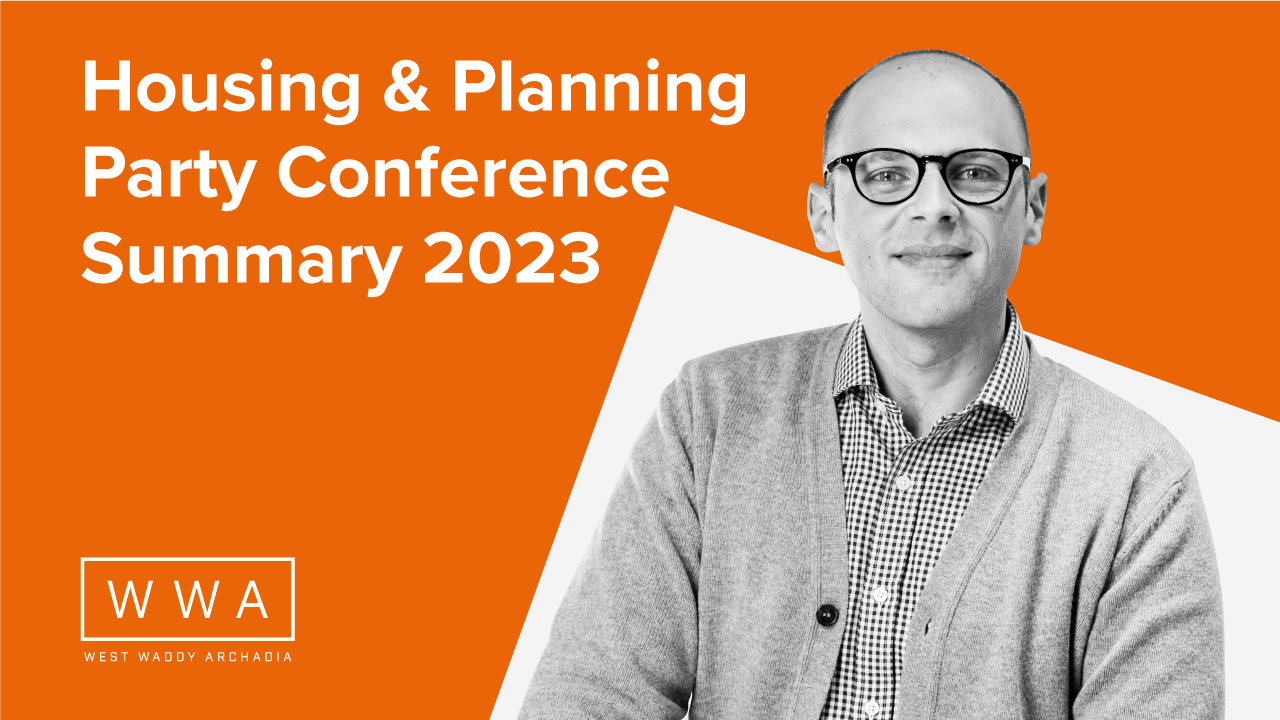Housing and Planning Party Conference Summary 2023
Following the conclusion of this year’s party conference season, Jonathan Headland, Urban Design Director, summarises the key considerations from each of the main political parties. Jonathan found it encouraging to see housing is now being pushed back into the wider mainstream debate, especially as we head into the next general election.

Liberal Democrats
The mood music coming into conference for the Lib Dems was one of continuing woos to the wavering Tory faithful. Ed Davey had already committed to protecting green belt land from housebuilding and was seeking a move towards enhanced localism on formal housing targets as indicated in the speech to conference by Helen Morgan, who speaks for the party on housing and communities. It was argued that national housing targets had failed to deliver and that enhanced localism could bring communities along with development. This type of approach would also enable a powerful doorstep headline of ‘Scrapping Housing Targets’ for the upcoming election that could play well to disenfranchised Tory voters. This methodology was dramatically rebuffed however and in an open vote led by young Lib Dems, the recommitment to the 380k annual housing target was maintained.
It is clear the party is conflicted by the desire to win disaffected Tory seats in the Home Counties and the aspirations and concerns of younger members, particularly in the context of recent history on tuition fees from their time in coalition with the Conservatives 10 years ago.
A summary of wider considerations around Housing and Planning likely to feature in a future manifesto are as follows:
- England’s housing market is fundamentally broken; it has left millions in insecure, low-quality and unaffordable homes, with no prospect whatsoever of their situation improving.
- Build 150,000 social homes a year, consisting of council houses and housing association homes, so that the less well-off in our society have the security that others enjoy.
- Build 10 new garden cities to help tackle the housing crisis, with modern infrastructure to ensure sustainable communities.
- Provide immediate security for renters via the introduction of a package of measures to give them security and stability and force all landlords to provide a high-quality service.
- Tackle the climate emergency and the costs of living crisis at the same time through an ambitious programme of retrofitting existing homes and ensuring that all new homes are built to the highest standards, cutting bills and emissions.
- Ensure that all voices are heard in the planning process, not just the vocal minority, by extending the duty councils and developers must engage the community in the planning process.
- Enhanced infrastructure provision on new development to ensure public services, transport and utilities are all in place prior to first occupation.
Whilst the fundamentals of the now consolidated Lib Dem party line on housing and planning reform makes for compelling reading and is not short of ambition; given the status quo of housing delivery and quality in the UK, I feel the lack of exactly how this would be achieved is telling of a party consumed by conflict. On one hand, they weigh a pathway to electoral victory against Conservative seats in the upcoming general election, on the other the soul of the party and its young member’s primary interests, time will tell how this is reconciled in the future manifesto.
Conservatives
Continuing a theme, unusual perhaps for a party which has been in power for such a long period, there was a distinctive lack of narrative on housing and planning reform at this year’s conference. Indeed, housing didn’t feature at all in the Prime Minister’s speech to conference, perhaps an indication of the true priorities of the party at present. Whilst there were numerous other mentions around housing and planning, especially at fringe events and almost unanimous agreement that something must be done, suggested solutions were in short supply. As such it appears to be a strategy of more prevarication and delay in grasping the nettle of meaningful reform. Given the impending General Election, which must be held by January 2025, it appears time may have run out for the Tories.
Housing secretary Michael Gove told an early fringe event that the Renters’ Reform Bill was on track for a second reading this autumn, however, he later went on to say, that he “hoped” the Bill would progress before King’s Speech, “but can’t guarantee it”.
Gove did however at least mention the word “homes” in his speech to conference, during which he made the following comments on housing:
- “We need to ensure that every family has a safe, decent warm home.
- “We need to ensure that many more young people can have a home of their own.
- “We’re on track to deliver a million new homes in this parliament, but we need many more. And our long-term plan for housing will deliver the attractive, affordable new homes that we need”.
- “We will build in the hearts of towns and cities and on brownfield land because that cuts commuting times, revitalises high streets and protects the green belt.
- “We will ensure that our new homes are energy efficient, zero carbon ready and built to the highest aesthetic standards. Because we are not just the party of opportunity and ownership, we are the party of beauty and nature.”
The SoS’ statement on ensuring that new homes are energy efficient and zero carbon ready, came directly after the Prime Minister’s announcement that he had deferred energy efficiency targets for private homes. Mr Gove also mentioned that Ms Maclean (Housing Minister) is “reforming the planning system, fighting for more homes”. There were no details on any of this, nothing about social rent or affordable home ownership and the much-anticipated NPPF revision is still awaited.
Sadly, there were few new ideas on housing and planning reform to be taken away from conference. The party feels in perpetual flux and as far away as ever, from providing a sense of overall stability on its own commitments and agenda, which the country so desperately needs.
Labour
The weight of expectation weighed heavily in the run-up to this year’s party conference with little indication of exactly where the Labour offer would be placed. Having now seen the details it is not short of ambition. Promising the delivery of 1.5m homes, planning reform, and the end of “sticking plaster politics”, Labour Leader Keir Starmer rallied his party in Liverpool on Tuesday.
Starmer described Labour as “a party of service” that would put the country first and the party second if it came into government. “We are the builders”, he told Labour Party Conference attendees. Starmer added later: “Getting Britain building again is critical for economic growth. It is our most important mission.”
Below are some of Starmer’s key promises from his speech:
- 1.5m homes will be built within five years. Starmer noted that there are numerous obstacles to delivering so many homes, citing the “restrictive” planning system, lack of local plans, and land banking as culprits. He also highlighted the fact that some people don’t want homes built near them. To those individuals, he had a message. “A future must be built,” Starmer said. “If we continually wash our hands of this task, we all end up in a rut. It’s time to get Britain building again.” A new generation of Labour New Towns is promised to turbocharge this delivery.
- The Green Belt will be re-examined. Starmer said that the delivery of the much-needed homes for Britain would not come at the expense of the Green Belt. Instead, it was the ‘Grey Belt’ that needed to be repurposed – sites that are designated as Green Belt but are actually brownfield.
- More development corporations are planned. Starmer said he would increase the number of these public sector companies, which are dedicated to driving development schemes in their area.
- A new focus on centralised infrastructure. The National Grid will get much-needed upgrades to increase its capacity and ability to handle more clean energy. That will be necessary, as Starmer also promised to create a publicly owned energy company, GB Energy, that will be based in Scotland. In addition to this, a National Wealth Fund would be established, which would invest in critical infrastructure projects. “As we share the risk, we must also share the rewards,” he said. “We will make sure the British people will retain a stake in our investment.”
Earlier at conference our new Shadow Levelling up Secretary Angela Rayner told conference that she was “not closing the door” on any option to increase the amount of affordable housing – such as buying up new stock, building new social homes and making it easier for councils to use receipts from right-to-buy sales. This is in stark contrast to Michael Gove’s department after they handed back £1.9bn to the government – including £255m meant to fund new affordable housing in 2022-23 – because it struggled to find projects to spend it on, Rayner said Labour would “unlock” government grants so more could be delivered.
In summary, the Labour leader noted there were no quick fixes and that “long-term solutions are not oven-ready” urging his party to stay the course. With the ambitious programme noted for housing alone, concern from many will be around whether this can be achieved within a single parliament, although Labour sees their tenure as potentially lasting longer still. It was refreshing to hear a vision for change which seeks to grasp the nettle of the housing crisis and begin to develop strategies to tackle this, undoubtedly difficult and fraught with electoral peril but seemingly with societal best interests at heart. Let’s see if Starmer’s message to neigh sayers of “If we continually wash our hands of this task, we all end up in a rut.” stands the test of time as detail around future manifestos comes to bear.




